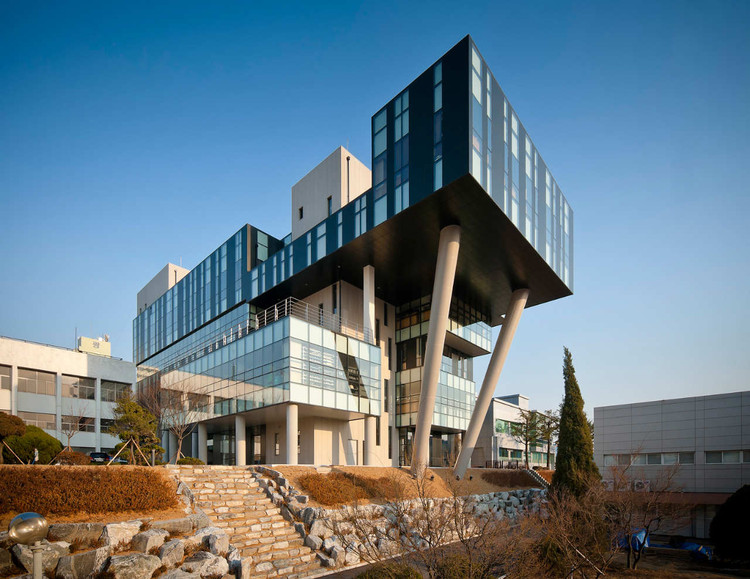
-
Architects: Baum Architects
- Area: 4082 m²
- Year: 2011
-
Photographs:Won Yang Kim
Text description provided by the architects. Korea Polytechnic, which has been taking care of vocational public training in Korea, presents a paradigm in education that is future-oriented, dynamic and innovative. Korea Polytechnic embodies Korea's prosperous future with an advanced technology.
For an efficient college administration and education, Korea Polytechnic runs I~VII college with 4 specialized ones, which are in total 11 colleges and 29 campuses all around the country. There are two-year degree courses, 18-month technician courses and 500 different education and training programs. Polytechnics VI – Gumi campus is specialized in the professional education of Electrics, Electronics and Communication.

Our project, the Engineering College, is located between the Main Building and the New Technology Center. The Main Building was constructed thirty years ago while the New Technology Center is newly built, making a historical contrast between the two. Before the construction of the Engineering College, the site had been unused and not noticed. However, it is situated in the campus center and surrounded by nature, historical buildings and major pathways. During the site visit, we envisioned the potential value of the place.

Our intention was to make the project site as a campus core: a center space for academic and professional exchange. To this end, thin and linear masses are chosen for the new Engineering College building bridging the main building and the New Technology center. Forming a dynamic outdoor space, transparent and solid masses are stacked crossing each other. Each mass contains the required building programs. Korea Polytechnics VI – Engineering College in Gumi Campus is now working as the heart of the campus.

The Engineering College is a linear building along the East-West axis and fully opens toward the North and the South. Natural ventilation, sunlight and view are important elements to bring into the interior space. The linear mass facilitates the frequent circulation between the buildings. Connecting two neighboring buildings, the three different buildings are recognized as one group.

To ensure a sense of continuity of campus possibly divided by the long and linear mass, we made the building recognized as a “gate for academic explorers,” not as a “wall to divide the campus.” For this, a piloti layout is planned on the 1st floor level. On the 2nd floor, the minimum required volume is left. A bridge passing through this volume allows the building to have a wide opening toward the north and the south minimizing the campus division and allowing a more thorough circulation along the wide panoramas. As a result, this project stands as a symbolic gate of the south campus.

The west façade of the Engineering College building gives a dramatic effect on the main access road. Accepting the natural ground level differences, the major cantilever is supported by two inclined columns protecting the lower part from the long unpleasant western sunlight. The columns also represent academic passion and ambition of Polytechnics.
The irregular mass combinations create a dynamic outdoor space. The outdoor space turns into various scenes with various spatial interactions. According to the campus environment, the direction and the required programs, the outdoor space serves as a gate, a roof, community space, a little bridge, a public deck or a terrace.















